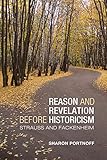Reason and Revelation before Historicism : Strauss and Fackenheim / Sharon Jo Portnoff.
Material type: TextPublisher: Toronto : University of Toronto Press, [2016]Copyright date: ©2011Description: 1 online resource (368 p.)Content type:
TextPublisher: Toronto : University of Toronto Press, [2016]Copyright date: ©2011Description: 1 online resource (368 p.)Content type: - 9781442643079
- 9781442695382
- 210 23
- online - DeGruyter
| Item type | Current library | Call number | URL | Status | Notes | Barcode | |
|---|---|---|---|---|---|---|---|
 eBook
eBook
|
Biblioteca "Angelicum" Pont. Univ. S.Tommaso d'Aquino Nuvola online | online - DeGruyter (Browse shelf(Opens below)) | Online access | Not for loan (Accesso limitato) | Accesso per gli utenti autorizzati / Access for authorized users | (dgr)9781442695382 |
Browsing Biblioteca "Angelicum" Pont. Univ. S.Tommaso d'Aquino shelves, Shelving location: Nuvola online Close shelf browser (Hides shelf browser)

|

|

|

|

|

|

|
||
| online - DeGruyter Religion, Redemption and Revolution : The New Speech Thinking Revolution of Franz Rozenzweig and Eugen Rosenstock-Huessy / | online - DeGruyter The Christ Child in Medieval Culture : Alpha es et O! / | online - DeGruyter Herder's Political Thought : A Study on Language, Culture and Community / | online - DeGruyter Reason and Revelation before Historicism : Strauss and Fackenheim / | online - DeGruyter The Evolution of Japan's Party System : Politics and Policy in an Era of Institutional Change / | online - DeGruyter Jean Monnet and Canada : Early Travels and the Idea of European Unity / | online - DeGruyter Reconciling Canada : Critical Perspectives on the Culture of Redress / |
Frontmatter -- Contents -- Acknowledgments -- 1. Background and Introduction -- 2. Strauss’s Formulation of the Relationship between Reason and Revelation in Modern Thought and His Rejection of a Practical Synthesis -- 3. Fackenheim’s Formulation of the Relationship between Philosophy and Revelatory Theology in Modern Thought -- 4. The Problem of Historicism -- 5. Reason and Revelation: Jewish Thought after Strauss and Fackenheim -- Notes -- Bibliography -- Index
restricted access online access with authorization star
http://purl.org/coar/access_right/c_16ec
Can contemporary religion, and particularly Judaism, exist without being informed by history? This question was debated in 1940s New York by two German refugees who later rose to prominence - Leo Strauss, one of the twentieth century's most significant political philosophers, and Emil L. Fackenheim, an important post-Holocaust Jewish theologian. There has been little consensus, however, on the definitive meaning of their work.Reason and Revelation before Historicism, the first full-length comparison of Strauss and Fackenheim,places the informal teacher and student in conversation alongside sections of their analyses of notable thinkers. Sharon Portnoff suggests that both saw historicism as the nexus of the intersection and tension between philosophy and religion and raised the possibility of the persistence of the permanent in the modern world. Portnoff illuminates our understanding of Strauss's relationship with Judaism, Fackenheim's oft-overshadowed great philosophical depth, and the function and character of Jewish thought in a secular, post-Holocaust world.
Mode of access: Internet via World Wide Web.
In English.
Description based on online resource; title from PDF title page (publisher's Web site, viewed 01. Dez 2023)


